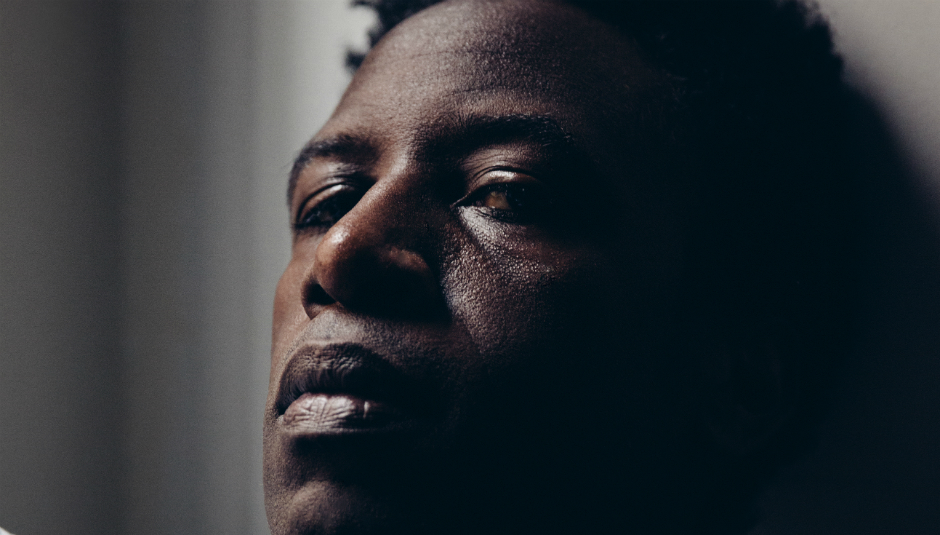Having been a fan of Saul Williams since his Rick Rubin produced, self-titled debut LP came out in 2004, I never once expected that I would be interviewing him. Especially about his love for Broadway musicals. But that’s Saul Williams all over. Defying expectations. Questioning modern dialogues about contemporary music, poetry slams, acting, and super adverse, intellectually damning music. A profound lyricist, and equally as acute a producer, Saul Williams is currently branching out from everything else he already does to create a movie, comic book, and an album trilogy, which kicked off with 2016’s MartyrLoserKing, an album that sees him conjure up the same level of esoteric, political narrative that was found on 2008’s The Inevitable Rise And Liberation Of Niggy Tardust. It’s much better to let him do the explaining, as talking is what Saul Williams is good at.
Ahead of his one-off, improvised, and non-rehearsed performance with King Britt at this year’s LeGuessWho? festival in Utrecht, Drowned in Sound asked Saul Williams about what we can expect, what’s happening with his film project Neptune Frost, and what he finds so fond about Andrew Lloyd Webber and the stage.
DiS: How did the upcoming project with King Britt come about?
Saul Williams: This is something that was curated by Moor Mother, who is a good friend of King’s. The talk of all of our collaborations had been in the air. As far as I know, it was Moor Mother’s idea, but because it was something King and I were already talking about, it just fell into our laps at the perfect time.
How far back do you know King Britt?
King Britt DJed at our party in Cannes for the release of Slam [William’s debut feature poetry film]. That was 1998. He was asked as I was familiar with his work then. But that was the first time I had met him.
To date, with the work you’ve released, you haven’t been that associated with DJ culture?
That’s true if you exclude drum & bass. That night in Cannes I met Goldie. Later I started working with DJ Krust and Roni Size. 'Coded Language' came out in ’99. My recorded work is very different from my performance work; performance wise I’ve always collaborated with DJs. I came up through the Lyricist Lounge and the underground things that were happening in New York in the mid to late '90s. I was more into electronic culture - but have always been one to toast with a DJ. But it’s true, I’m not a frequenter of the scene, but I’ve always been on the sidelines.
So will your performance with King Britt will be more a live-jam?
Yes. It’s gonna be electronics, and it’s going to be words. The improvisatory side of things of what I do is something I’ve always experimented with. This is essentially going to be an exploration of sound and words. I have purposefully not discussed it with King, because it was my idea to be - whatever we do, we do it on that night.
What is the performance name 'Unanimous Goldmine' in reference to?
It’s something I pulled out of the graphic novel I’ve been working on for a few years. It comes out in 2019 next year. I’ve been working on this novel MartyrLoserKing simultaneously with this musical theme component called Neptune Frost. 'Unanimous Goldmine' is simply the greeting they all use in the story. It’s this kind of sci-fi magical-realism story, and in this world, which is kind of this alternative reality, 'Unanimous Goldmine' is the greeting - like 'hey, what’s up.'
You went through a Kickstarter to raise funds for this. Did you reach your goal?
Well, we got everything we asked for. I did not intend to acquire the entire film budget, which is like $1.2 million. I acquired the .2. But that was the goal. What I was doing, was securing the security of my pitch, as I talk to investors and now have people like Lin-Manuel [Miranda], attached to the project.
How much longer is there do you think before you can go into production?
I go into pre-production next Fall, and shoot December 2019 in Rwanda.
Is this the first time you’ve been involved from conception to fundraising and production through to the actual shooting of a movie?
Yes and no. I was involved in Slam from conception, but just as a writer and an actor. Although I was in heavy contact with the directors and producers, I played no part in raising the money for that film. This is my first time directing and taking the helm of the ship.
What have you learnt from doing all of this?
Before I got into this, I realised a few things. Right now I live in Los Angeles. I’ve never felt like this film would even attempt to align with a film studio. I’ve always conceived of my work independently and have always considered myself to be an independent artist - and when it comes to filmmaking, I’m a big fan of independent filmmaking. So I began the process of securing the funds for even the trailer independently from sources who have little to do with Hollywood - and that remains the method of operation for me. I may be in that mix a bit, but I don’t fuck with it too heavy, largely because my aesthetic choices in regards to everything are not heavily tied to the commercial aesthetics that I see running the game.
Everything that I’ve ever worked on has come from that sort of abstract route and source, and I’ve been playing with the idea of bringing somewhat avant-garde ideas to the cycles of popular culture. I think the interests in popular culture for experimental works kind of shifts with time, and they weave back and forth. I found the window of opportunity with Slam, and I found windows of opportunity with each one of my albums. Basically, I’ve always played for doing the types of work that I’m interested in and that I think is important regardless of where certain executives think my work is - and I’ve held my ground in that regard, to essentially trust my process. My process with the MartyrLoserKing project, which is a multimedia project featuring a graphic novel, three albums - the first of which is MartyrLoserKing which came out in 2016, the second is called Neptune Frost which I’m mixing right now, and the third will come out right before the film - and then there’s the film Neptune Frost.
I realised I could build these things on my own.
The main thing I learned was that if I went to a producer, and I pitched a project, they would want to see the script. And my response is, who says that’s the way that I work. Who says I wrote the script first, maybe I wrote the music first. Maybe I’m not interested in showing anyone the script? There are actually directors like Wong-Kar-wai, who gets films done without showing anyone the script. There’s the story of Boots Riley and how he got Sorry Yo Bother You done without one producer letting any of the other producers see the script. I need to be in control of what I do and in what order. My process works for me and that’s what is important.
How is the way that you intend to go about producing this film differ from the way you’ve gone about producing your albums in the past?
There’s a big difference between an album and a film. On one hand, the main difference is how needy I am of other collaborators. For example when it comes to the film Anisia Uzeyman, my collaborative partner, plays a huge role in helping me understand the process, from storytelling to packaging a team.
When I’m working on an album, I’ll often work with one producer, but they often come in and leave me alone for a long time allowing me to get to a point when I’m ready to share it, or take criticism or advice. Then there comes a point when I’m ready to share it, we do a little bit of work, hire a mixer, and then we go about talking to the labels.
With the film, it’s way more collaborative. With the Neptune Frost album, I did an experiment where I crafted all of these demos for the songs, and then sent them to the producers I would normally send music to asking for a remix - and ask them to give me remix ideas that I would incorporate into the song, and then share the writer’s credit. So I ended up with an extremely collaborative album - way more collaborative that I’ve ever been. There’s not a lot of features, there’s just more musicians’ advice I’ve incorporated into the work.
What stylistic cues would you say you’ve taken on board for the film?
The film was really inspired and conceived by a moment from when I was living in Paris and spending a lot of time in Senegal because of a film I was cast in, along with Uzeyman, that was directed by Alain Gomis called Aujourd'hui. Being outside of the Hollywood aesthetic and being introduced to more independent and African filmmakers, there was an interest I found in the idea of narrative that truly inspired me.
Realising that not every story has to be told in the format of 'once upon a time' - circular narratives have interested me as a poet. Even all of the books of poetry I’ve released have had a conceptual narrative that has pushed me closer to wanting to write a novel. My 2003 book, Said The Shotgun To The Head, is written from the perspective of a character - an entire poem. I’ve always played with these ideas to try and liberate myself from one form of intimacy and to connect me to what I feel is a heightened form of intimacy through a sort of empathic gaze on a more universal relationship to human emotion. I’ve been inspired by a lot of off the beaten road film-makers, a lot of amazing woman storytellers and literature as well.
The side of it that makes it a musical would be the most commercial aspect of my influence and that’s because I grew up on Andrew Lloyd Webber. I grew up in New York in the '80s. It’s not just stuff like Jesus Christ Superstar, where the music itself blew my mind. One thing to point out about Jesus Christ Superstar is that it is a film and play inspired by an album - the album came first.
So is your long-term goal here to take the whole thing to Broadway?
That was the first goal before it became a film. I was working on Neptune Frost as a musical for the stage. And, around that time when I moved to New York I was cast in a musical on Broadcast - Holler If Ya Hear Me - which is how I met my first producer for Neptune Frost, Stephen Hende,l who produced Fela The Musical. He and the other producers I approached all suggested that this was a movie. I was resistant at first, and slowly realised it would actually be fun. Those shifts in the writing process began to take shape.
It made sense, not only because I was influenced by musicals on Broadway. I was very inspired by the films I grew up on. As corny as it sounds, as a kid I watched Mary Poppins 80 times. There was something about The Warriors - which isn’t a musical - but is heavy on music and has a really dope inspired synthy score. I remember being inspired by The Wall, which is also deeply problematic in many ways, and then there’s stuff like The Wiz. So the idea of wanting to make a musical is the most commercial side of the idea, and the oldest.
Even when I go back to Slam, the way that poetry and music rides in that film — I watched it again recently as it’s the 20th anniversary — actually I didn’t watch it, I just listened to it, and it really operated like musical. I don’t understand how we’ve made music to sound a particular way to sound like it’s in musical. And that’s why I point to stuff like The Wall - what if music can be super punk and agro as opposed to having that Broadway musical sound?
One film that really inspired me a decade or so ago was Once - it turned into a play, but I believe it’s Irish. It’s this busker musical and what’s inspiring about it was that the music in that film happened in real time. Meaning that if you were to come over my house, and I’d say "Have you heard this yet?" We would sit and listen to it for five minutes, just like it would in real life - that’s how it happened in the film, which is something that never really happens in most musicals. Our lives are full of music, we cut conversations when our favourite songs come on, we turn it up, we walk around with headphones on - we live in musicals but don’t really have film reflected in that.
I’m still surprised after all the craziness of MTV, that we haven’t had a musical that is the answer to the amount of time we’ve spent watching music videos.
It’s almost as if the classical approach to operas are still heavily ingrained within contemporary music and film culture.
Yes, that has to do with the gatekeepers and all that type of shit. Which is part of the reason why I have to conceive of this kind of stuff in my studio and get it to a certain point before I bring people in. Because if I say the word musical, people think they have the idea of how it works and sounds based on this formulaic approach that is not really necessary. I feel like when that when Andrew Lloyd Webber began that process, he was breaking it - anything from Cats to Jesus Christ Superstar - the music in that was crazy for the time! Zeppelin-esque, members of Deep Purple played the music on the album. I know a lot about that because I tried to sample that on my first record, and that was the one sample we could never clear, and it was my favourite song. I was traumatised.
What song was that?
It’s a song called 'The One' that was never released because I sampled 'With Heaven On Their Mind'. I didn’t want to replace the sound. I was so mad, so I scrapped that song.
Do you keep up with Broadway?
Of course. I’ve seen Hamilton. I stay in and out of that wold. I’m a New York theatre kid. My ear is always to the ground.
Going back to the Neptune Frost album, is it totally conceptual?
It is totally conceptually. It's the most far-out sounding record I think I’ve ever done. I also think it’s the warmest and most beautiful - the most healing sound I’ve ever been able to achieve. Aesthetically it’s my favourite. I would also say it’s a spoken word album, and I would also say a lot of the text was pulled from the graphic novel, and it’s being mixed by Gonjasufi. I’m a huge fan - I was doing work for his upcoming album and was amazed that he mixed his own albums.
I feel like he has an old-school dub approach to production?
Oh - he is Lee Scratch Perry. Exactly. It’s super exciting.
Saul Williams will perform at LeGuessWho? which takes place in Utrecht, The Netherlands, from November 8-10. For more information about Williams, please visit his official website.






















